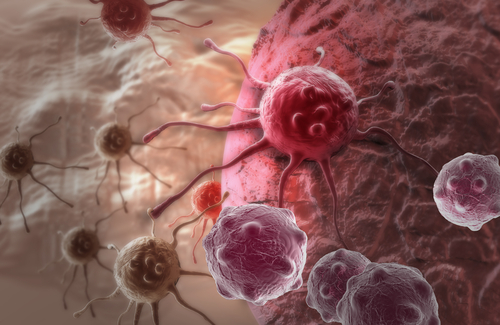FATE-NK100, a natural killer cell immunotherapy, induced stable disease in one of the first two heavily treated ovarian cancer patients in a Phase 1 trial. No dose-limiting toxicities have been reported so far, Fate Therapeutics announced.
The findings were recently revealed during the oral presentation, “Novel strategies to activate Adaptive NK cells and Make them antigen specific,” at the Innate Killer Summit 2018 in San Diego, CA.
FATE-NK100 is designed to boost patients’ immune response against cancer cells. It is composed of donor-derived natural killer (NK) cells — an immune cell subset — activated in the lab for better anti-tumor activity.
NK100 has shown promise in fighting both solid and liquid cancers. Compared to other NK cell therapies, the treatment is better at overcoming immune evasion strategies, such as activation of immune checkpoint pathways.
The APOLLO trial (NCT03213964), currently recruiting participants at the University of Minnesota, is designed to evaluate the safety and efficacy of ascending NK100 doses in 16 ovarian cancer patients who failed to respond or progressed following platinum-based chemotherapy.
The trial’s primary goal is to determine the maximum tolerated dose, and secondary outcomes include the proportion of patients who respond to the therapy, the time a patient lives without disease progression, and overall survival.
Preliminary data from the first two patients has shown a good safety profile, with no treatment-related toxicities.
Both patients had already received five prior lines of therapy. Patient 1 received the lowest NK100 dose (10 million cells per kg), and patient 2 received the second dose level of 20 million cells per kg.
But while patient 1 showed disease progression at day 28 of follow-up, patient 2 showed no signs of cancer progression (stable disease) and evidence of tumor reduction. Patient 2 was then selected to receive a second administration of NK100 and is being evaluated for long-term benefits.
APOLLO is now enrolling patients into the third dose level of NK100 — from 30 million to 100 million cells per kg.
“We are very encouraged by our initial clinical observations of FATE-NK100 in heavily pre-treated patients with recurrent ovarian cancer,” Melissa Geller, MD, associate professor at the University of Minnesota and principal investigator of the APOLLO trial at the Masonic Cancer Center, said in a press release.
“Currently approved single-agent therapies for platinum-resistant ovarian cancer typically have low response rates and short median progression-free survival,” she said. “The administration of NK100 directly within the peritoneal cavity is a novel therapeutic strategy to potentially improve these dismal outcomes.”
Jeffrey S. Miller, MD, professor of medicine and deputy director of the Masonic Cancer Center, said the clinical trial team is “impressed with the safety profile and enhanced persistence of FATE-NK100.
“These data in ovarian cancer reinforce our experience with NK100 in the VOYAGE study [NCT03081780] for relapsed refractory AML and strengthen our conviction that NK100 is capable of addressing a broad range of tumors, including those that are known to be unresponsive to current immunotherapies,” Miller said.

